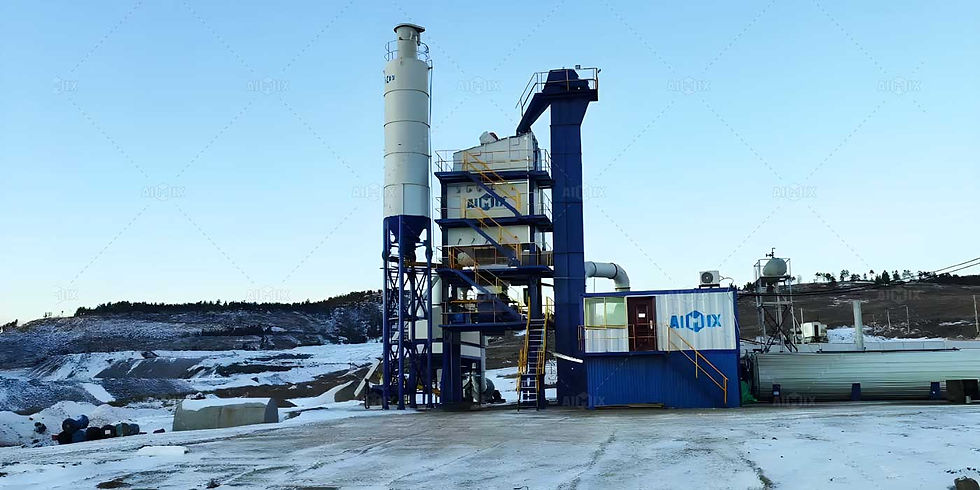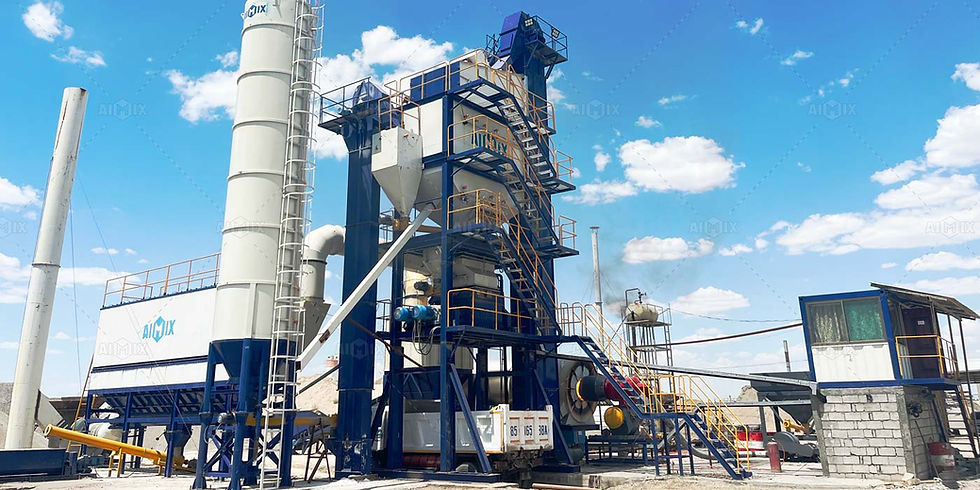How Much Can Contractors Save Annually with a 60 TPH Mobile Asphalt Plant?
- aimixglobal5
- Aug 28, 2025
- 4 min read
For many contractors, asphalt material costs account for a large portion of project budgets. Whether you are involved in road construction, urban infrastructure, or private development, every ton of asphalt delivered from an outside supplier adds up. With 60 TPH (tons per hour) mobile asphalt stations, contractors often ask the key question: how much money can we save each year by producing asphalt on-site instead of relying solely on commercial suppliers? Let’s break it down with practical examples, real cost factors, and industry insights.

Why Asphalt Material Costs Impact Profitability
Contractors know that asphalt prices can fluctuate based on oil prices, aggregate supply, and transportation fees. Outsourcing asphalt production usually means you are locked into market prices, which may rise unexpectedly. In contrast, producing your own asphalt gives you control over material costs, mix designs, and delivery schedules. This control directly impacts project profitability, especially when project volumes reach tens of thousands of tons per year.
Since most contractors handle multiple projects annually, even small savings per ton can create huge differences in the final balance sheet. That is why many companies now compare outsourcing costs against the investment of a portable asphalt plant near me.

How a 60 TPH Mobile Asphalt Plant Reduces Costs
A 60 TPH plant means you can produce up to 60 tons of asphalt per hour. If you work eight hours per day, that equals about 480 tons daily. Over 200 working days per year, that comes to roughly 96,000 tons of asphalt. While not every contractor produces that much, even half of that figure shows the potential savings.
1. Savings on Asphalt Purchase Price
The average market price of asphalt in many regions ranges from $70 to $100 per ton. When you buy from commercial suppliers, that cost is fixed. By producing on-site, your material cost per ton can drop to $40 to $55 per ton, depending on raw material and fuel costs. This difference of $20–$40 per ton creates significant annual savings.
2. Savings on Transportation Costs
Transporting asphalt from a supplier often costs $5 to $15 per ton, depending on distance and fuel prices. A mobile asphalt plant allows you to produce directly at or near the project site. This not only saves fuel and trucking costs but also reduces material loss caused by long transport times, especially in hot climates.
3. Time Savings and Higher Efficiency
Waiting for asphalt deliveries can delay paving schedules. A mobile asphalt mixing plant lets your team control production speed and match it with paving progress. This leads to fewer idle hours for workers and machines, which translates into lower overhead expenses and faster project completion.

Example: Annual Savings for a Medium Contractor
Let’s assume a contractor handles 50,000 tons of asphalt per year. If they buy from suppliers at $85 per ton, the total cost reaches $4.25 million. With a mobile asphalt plant, the cost may reduce to $50 per ton, bringing the total to $2.5 million. That means a potential saving of $1.75 million annually.
Even if production volumes are smaller, say 20,000 tons annually, savings could still reach $700,000 per year. These numbers clearly show why many companies consider investing in a 60 TPH mobile asphalt plant as a long-term strategy rather than just a purchase.
Beyond Cost: Strategic Advantages
Cost savings are important, but control and flexibility are equally valuable. With your own mobile asphalt plant, you can:
Adjust mix designs to meet project-specific requirements.
Respond quickly to sudden project changes without waiting for suppliers.
Secure consistent quality instead of relying on third-party suppliers.
Strengthen your competitive advantage when bidding for projects.
These benefits position your company as more independent, reliable, and competitive in the construction market. That independence often wins more contracts, which means even greater returns over time. Learn about the overall asphalt plant cost at right!

Is a 60 TPH Mobile Asphalt Plant the Right Choice for You?
If your annual asphalt demand is above 15,000 to 20,000 tons, owning a mobile plant often becomes more economical than outsourcing. For contractors with multiple projects across regions, the mobility feature ensures you can move the plant between sites, maximizing its utilization. In short, if you want to reduce costs, improve efficiency, and gain control over production, a 60 TPH mobile asphalt plant is worth serious consideration.
Conclusion: Turn Savings into Growth
So, how much can contractors save annually with a 60 TPH mobile asphalt plant? Depending on your project volume, savings can range from hundreds of thousands to over a million dollars per year. More importantly, these savings can be reinvested into equipment, workforce, or new contracts, fueling long-term growth.
If you want to cut costs, speed up your projects, and gain control over your asphalt supply, a mobile asphalt plant could be the key. Contact us today to learn more about customized plant options, production capacities, and after-sales support. Let’s work together to make your next project more profitable and efficient.



Comments